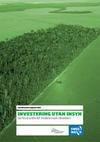2013-04-15
Investment without transparency
The lack of transparency in relation to the Second Swedish National Pension Fund's, AP2’s, investment in agricultural land in Brazil makes it impossible to examine whether the Fund lives up to its commitment regarding ethics and the environment.
An increasing number of actors consider agricultural land as a stable and long-term investment. Climate change, population growth and the demand for biofuels and animal feed increase the competition over arable land. AP2 has invested 450 million dollars in a company that buys land in the U.S, Australia and Brazil. On the farmland in Brazil soybean, sugar cane, cotton and corn are farmed on an industrial scale. According to AP2, the investments have a great emphasis on sustainability but due to reasons of competition the Fund will not state where the acquired land is located. The argument is that the Fund wants to buy up land while it is still cheap. Swedwatch’s study has shown that there is no regular monitoring of conditions at the farms on behalf of AP2 or the other investors.
Investments in the agricultural sectorare associated with serious risks to people and the environment. High use of toxic pesticides and poor working conditions are major problems in Brazilian agriculture. As the large-scale industrial agriculture expands, large parts of the Brazilian Cerrado savannah with its unique biodiversity is disappearing, and both soya bean and sugar cane plantations encroach on the traditional territories of indigenous people. Two of AP2's business partners in Brazil have been accused of involvement in violations of indigenous peoples’ and workers’ rights through their subcontractors.
Made in collaboration with: Solidarity Sweden-Latin America


